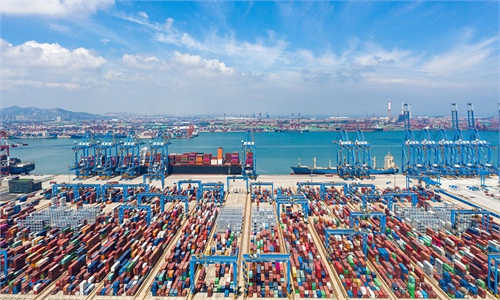
The Beijing skyline Photo: VCG
China's economy is projected to continue to gain momentum in 2024 after an uneven post-pandemic recovery seen this year, to be led by enhanced scientific research and technological innovations, and supported and propelled by the government's package of proactive fiscal and monetary policy stimulus as well as a gradually rebounding real estate sector.The World Bank released its latest China Economic Update on Thursday, which estimates the world's second-largest economy will expand by 4.5 percent next year, while the global average economic growth would reach only 2.4 percent in 2024. The organization says China's economy will have grown by an impressive 5.2 percent this year.
"There remains the likelihood of a protracted recovery in the real estate sector and persistently tepid external demand (outside China). To bolster growth, the government is expected to uphold a moderately expansionary fiscal and monetary policy stance in 2024," the document reads. The World Bank also pointed out some structural constraints to China's growth, including local government debts, an aging population and the housing sector slump.
In 2024, the challenges facing Chinese economy include insufficient effective market demand, excess capacity faced by some industries, tepid social expectations and the hidden risks. There are still obstacles in the country's domestic circulation, while overall external environment has become more complicated and uncertain.
According to the just-concluded Central Economic Work Conference held in Beijing earlier this week, the policymakers have set their eyes firmly on new technologies, such as deep digital tech breakthroughs and artificial intelligence, to lead China's next-phase economic development.
More financial and human resources will be deployed to inspire state-owned research organs and private companies to achieve breakthroughs in crucial technologies in 2024 as part of Beijing's determined push to cultivate new and powerful boosters for economic growth despite external challenges and geopolitical volatilities orchestrated by some countries.
Detailed measures may include leveraging the government's special bonds to back up innovation by all types of business groups and research institutes, while motivating the country's privately run high-tech companies to participate in key innovation projects such as high-end batteries, semiconductors, robotics and industry-leading software products such as autonomous driving solutions, AI solutions and quantum computing systems.
The annual economic work conference, which ended on Tuesday, called for non-stop and strenuous efforts to promote the country's industrial and service sector upgrading through consistent innovations in science and technology, and in particular, to forge new levers of growth and more advanced business models that are backed up with cutting-edge and even disruptive new technologies.
The economic conference noted that China continues to face challenges such as a lack of effective market demand, excess production capacity in certain sectors and lackluster social expectations, but overall, favorable conditions outweigh unfavorable factors, and the fundamental trend of the country's economic recovery and long-term positive outlook has not changed. And, the tone-setting important meeting called for effective efforts to ratchet up countercyclical and cross-cyclical adjustments of macro policies and asked for efforts to continue implementing a proactive fiscal policy and prudent monetary policy.
The economic conference provided clear guidance for the country's future industrial transformation roadmap. Compared with traditional productivity tools that are driven by elements such as labor, land and capital, new boosters are led by innovations and new elements such as data. In recent years, China has continuously made progress in artificial intelligence, commercial aerospace, quantum technology and biomedicine.
In 2024, the external environment will likely remain complex and challenging, and stabilizing domestic market demand is widely considered the cornerstone and foundation of China's economic rebounding. The central economic work conference has urged for earnest efforts to stimulate home consumption, increase effective investment, while try to form a mutually reinforcing virtuous relationship between investment and consumption.
To rejuvenate the economy, a series of complementary structural reform measures are needed to boost confidence and revive growth momentum, such as improving China's debt-resolution framework and strengthening the enabling environment for private enterprises. There has been substantial reallocation of investment from real estate to manufacturing in the past years. A fair and competitive market and a predictable regulatory environment will ensure that capital flows to the most productive sectors.
China's economic growth picked up pace to obtain a faster-than-expected 4.9 percent expansion in the third quarter this year, bringing growth for the first nine months of 2023 to 5.2 percent, up from 3 percent for all of 2022, despite the drag from a property market correction. It indicates that China remains on track to achieve its growth target of more than 5 percent for this year, surpassing other major economies in the world.
Next year, as the US Federal Reserve and the central banks in major European economies start to adopt a relatively relaxed monetary policy by cutting interest rates, which will create favorable conditions for China's macro policy-making. Some have said that China's central bank could move to increase market liquidity supply and even reduce the benchmark interest rates to stimulate economy, such as boosting housing sales and reviving the equities market. So, the World Bank's prediction of 4.5 percent economic growth is believed to be tenable.
The author is an editor with the Global Times. bizopinion@globaltimes.com.cn



